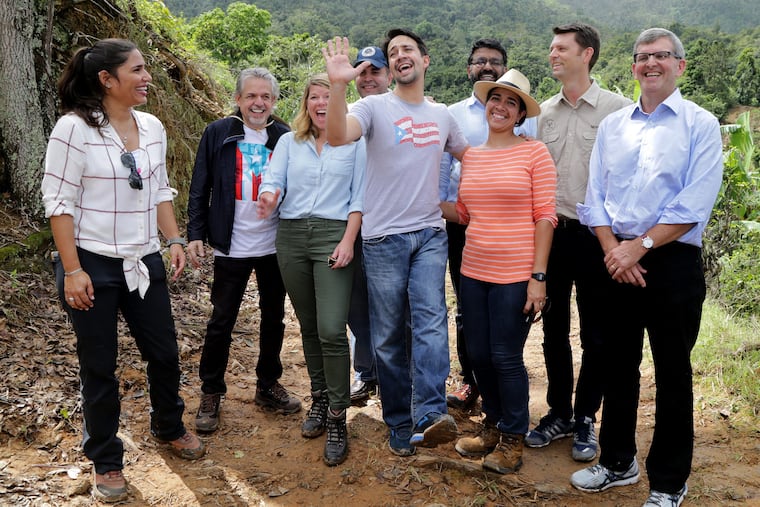Lin-Manuel Miranda is trying to revive Puerto Rico’s devastated coffee industry
Miranda is the public face of a multimillion-dollar, five-year effort that's being spearheaded by The Hispanic Federation and includes heavy-hitters like Starbucks, Nespresso, and the Rockefeller Foundation.

JAYUYA, Puerto Rico — Taking a break from conquering Broadway, making movies, and writing books, Lin-Manuel Miranda tramped up a muddy slope in Puerto Rico's highlands on Wednesday, assessing his next challenge: helping revive the island's ailing coffee industry.
Miranda is the public face of a multimillion-dollar, five-year effort that's being spearheaded by the Hispanic Federation and includes such heavy-hitters as Starbucks, Nespresso, and the Rockefeller Foundation.
"These are the Avengers of coffee," he said of the assembled group, likening them to a pack of superheroes. "And you don't call in the Avengers when things are easy. You call in the Avengers when things are difficult."
The island's estimated 4,200 coffee farmers certainly need the help. Hurricanes Irma and Maria destroyed about 80 percent of the harvest last year.
Under this initiative, the Hispanic Federation — which was founded by Miranda's father, Luis — and Nespresso are each investing $1 million into the project. Starbucks will invest $475,000 and donate two million climate-resistant seeds. The Rockefeller Foundation is investing $500,000, and TechnoServe, an international nonprofit with a history of supporting the agricultural industry, will help implement the project.
The team has set the bar high. William Warshauer, president of TechnoServe, said models suggest that coffee production could double its pre-hurricane levels within the next five years. And small farmers could see their profits increase 300 percent to 400 percent.
Puerto Rico's coffee production was collapsing even before last year's twin hurricanes. In 1995, the country produced 280,000 quintals — or 100-pound sacks — of coffee. Last year, before the hurricanes hit, production had fallen to just 65,924 sacks. But despite its decades-long struggle, coffee has always had a powerful role in the Puerto Rican psyche.
"We've always been proud of our coffee," Miranda said, hiking up his pant-leg to show a small tattoo of a coffee cup.
Miranda — the winner of the Pulitzer Prize, a Tony, an Emmy, and a Grammy for his work on the musicals Hamilton and In the Heights — has been a vocal advocate for the island and its post-hurricane recovery. His family is from Vega Alta, on the northern coast of the island, though he lives in New York.
Visiting Puerto Rico shortly after Maria tore through it, he said, he saw the denuded and brown landscape the storm left behind.
"You would never think you would see winter come to Puerto Rico, but that's what it looked like," he said.
The Hispanic Federation, a New-York based nonprofit and advocacy group, jumped in to help with emergency relief efforts shortly after Maria, which is blamed for killing nearly 3,000 people, destroying huge swaths of the island, causing months of blackouts, and worsening an already perilous economic situation.
Puerto Rico's deeper structural problems were inescapable, said the organization's president, Jose Calderon. That a fertile and tropical island has to import 80 percent of its food illustrates the dysfunction.
That situation "is the bigger task for us," he said. "How do we reimagine Puerto Rico? How do we make this a place that can provide for its people and work for its people?" Helping revive the coffee industry is part of that larger vision, he said.
Vanessa Arroyo, a 36-year-old coffee farmer, said Maria set her farm, La Franca, back years. Of the 7,500 pounds she was expecting to harvest, she was left with about 1,000 pounds. Of the 20 acres of coffee she had planted, about half the plants survived.
"When I saw my farm after Maria, I didn't even recognize it," she said.
Just as she was recovering from the storm, a fungus hit, killing more of her plants. Unsure what to do, she resorted to YouTube videos looking for answers.
She's hoping the technical training and support provided by the initiative will help her turn the corner.
"I have so much hope in this," she said. "I have a lot of faith."
One of the key elements of the project is the donation by Starbucks of two million high-quality, climate-resilient seeds. The effort will include funding to train local nurseries to improve local varieties.
"We'll have a combination of local seeds and the imported seed to try to spark some hope in the industry, quite frankly, that revitalization can happen quickly," said Kelly Goodejohn, the director of social impact and public policy at Starbucks.
Zia Khan, vice president of innovation at the Rockefeller Foundation, said his nonprofit is committed to promoting a broad recovery for Puerto Rico. And one of the key elements of that has to be its farmers.
"We have done so much work over 100 years supporting agriculture and farmers and we know how critical it is — not just for food supply and value chains, but for small-business people," he said. "And coffee is a good small business."
About 70 percent of Puerto Rican coffee growers are considered "small" — operating on plots of fewer than 10 acres.
Miranda, who stars in Mary Poppins Returns, a sequel to the classic children's movie, and is preparing to reprise his lead role in Hamilton for its Puerto Rico debut in January, said he wanted the coffee initiative to bring hope to the island's hard-hit farmers.
There's a frequently repeated saying on the island that Puerto Rican coffee used to be served to the Pope at the Vatican. "We'll get there again," Miranda said.
Miranda, who has been raising money for Puerto Rico's recovery since the storm, has said proceeds from the Hamilton run will benefit the U.S. territory's hurricane recovery.
"We are all pitching in to bring coffee back to Puerto Rico," he said.